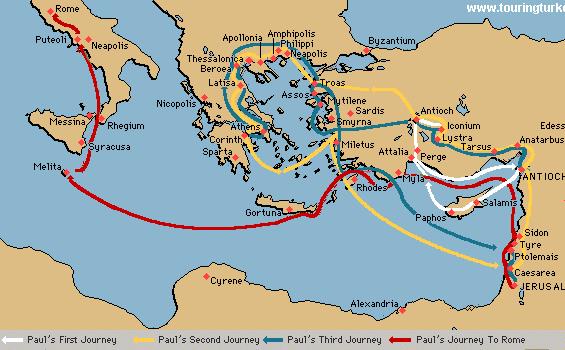Copyright 2018 by Joan Berry
The stoning of Stephen in Jerusalem was the event that triggered the spread of the gospel to the Gentiles. Many of the believers fled for their lives to Antioch in Syria where a large population of Jews was already established. Once there, the refugees established the mother church for the believers (Carson & Moo, 2005, p.238). Antioch is where the first Gentile church was established because the gospel message of Jesus was so well received (Alexander & Alexander, 2009, p. 643). After a controversy over restrictions Jews wanted to place on Gentile converts, Paul removed the two main obstacles that Gentiles faced in converting to Christianity; the circumcising of men and dietary laws. [In Galatians 2, Paul removed these restrictions from non-Jewish converts. He wanted no obstacles in the way of their conversion]. From the Antioch church, Paul’s missionary journeys were commissioned to the world as presented in the Book of Acts which covers 30 years beginning with the birth of the new church at Pentecost until Paul’s imprisonment in Rome (Alexander & Alexander, 2009, p. 643).
Paul’s Missionary Journeys
Paul’s missionary home base was in Antioch, Syria about 300 miles north of Jerusalem. Looking on a map (see insert) one can see the advantage of that location as access to other regions. Antioch was a Christian stronghold and remained so until the Muslim invasion in the seventh century (Niswonger, 1992, p. 206). The founding of the church at Antioch is believed to have taken place circa 32-44 A.D. by church members fearing for their lives following the stoning of Stephen (Niswonger, 1992, p. 208). Believers in Antioch were the first to become known as Christians, given that name by people outside the fellowship of the church (Niswonger, 1992, p. 207). At the time of Paul’s missionary journeys, the Jewish population in the city was about a half million and under Roman rule. Antioch was a commercial center and due to the wealth of the Christians there, they were able to send Paul and Barnabus with supplies to the Jerusalem poor during the famine (Acts 11:29-30), (Niswonger, 1992, p. 206). It was during the trip to Jerusalem that they added John Mark, cousin of Barnabus, to their company. The first missionary journey most likely began around 47-48 A.D. and was commissioned by the Antioch church.

Map of Paul’s missionary journeys courtesy of Ken Anderson.
Paul’s Missionary Journeys Timeline.
Circa 47-48 C. E.,. Paul’s first missionary journey was to Galatia (Acts: 13-14 NIV). The places Paul and Barnabus traveled to were: Selucia, Cyprus (native land of Barnabus), Salamis, Paphos, Attalia, Perga, Antioch of Pisidian, Iconium, Lystra, Derbe, and then returned to Antioch of Syria. At Paphos, Paul struck Elymas, a sorcerer, blind because he had interfered with the faith of a new convert, Proconsul Sergius Paulus (Niswonger, 1992, p. 212). John Mark, for reasons not explained, left the journey shortly after the group landed at Perga in Pamphylia which created a rift between the apostles (Niswonger, 1992, p. 210). Paul and Barnabus preached first to the Jews in the synagogues and when the message was rejected, they preached to the Gentiles (Carson & Moo, 2005, p.288). At Lystra, they encountered a problem with the pagans proclaiming they were gods after they healed a lame man and Paul preached to them that they needed to worship the true God. The Jews stirred up a crowd which stoned Paul and left him for dead outside the city (Niswonger, 1992, p. 213).
Paul’s Second Missionary Journey: Greece.
A.D. 50-52.The second missionary journey (Acts 15:36-18:22 NIV) began in Antioch of Syria and from there they traveled through Cyria and Cilicia to Lystra, Phrygia, Galatia, Traos, Philippi in Macedonia, Thessalonica (largest city in Macedonia, Berea, Athens, Corinth (where they stayed for nearly two years, Ephesus, Caesarea, and then returned to Antioch of Syria. Due to the rift over John Mark, the apostles separated for this trip with Paul recruiting Timothy and teaming with Silas to return to Asia Minor; Barnabus took Mark with him to continue ministering in Cyprus (Niswonger, 1992, p. 222). Paul and Silas run into trouble in Philippi when Paul performed an exorcism and landed in jail. Paul fell back on his Roman citizenship and secured his release. They likewise had to flee Thessalonica and Berea and ended in up in Athens for safety (Carson & Moo, 2005, p.288-289). They preached for a time in Athens but not with much success and they moved on to Corinth where they remained for about a year and a half and where he had to defend himself before Gallio, a Roman official. Also at this juncture, they recruited Priscilla and Aquila to help spread the gospel and they in turn enlisted the help of Apollos (Carson & Moo, 2005, p.289). Paul, Silas, and Timothy left for Ephesus where they remained for two and one-half years. Forced to leave by an uprising, Paul left there and made his way to the coast, sailed to Caesarea and then further traveled to the mother church at Antioch, Syria (Acts 18:20-22 NIV).
Paul’s Third Missionary Journey: Return to Asia and Greece.
A.D. 53-58. The third missionary journey (Acts 18:23:21-21:15 NIV) of Paul began in Antioch, Syria through regions of Galatia and Phrygia, Ephesus where he remained for about two years, Macedonia in Greece, Traos where he raised Eutyches from the dead, Assos, Mitylene, Chios, Samos, Miletus, Tyre, Ptolema, Caesarea, and Jerusalem. On his return to Ephesus, Paul learned that the disciples there only knew of John the Baptist’s baptism and he laid hands on them so they received the baptism of the Holy Spirit. His book of I Corinthians was written in Ephesus and later wrote 2 Corinthians somewhere else in Macedonia (Niswonger, 1992, p. 233; Acts 19:4-7 NIV). His plans to sail to Syria were changed when he learned of an assassination plot to kill him on board the ship. Instead, he went to Miletus where he met the elders for what they thought would be their last meeting. From there he traveled to Palestine where he received the prophetic message that he if he went to Jerusalem he would be arrested (Niswonger, 1992, p. 238). He was determined to deliver an offering for the church there and was arrested as prophesized, his missionary journey at an end (Acts 21:27 NIV).
Epilogue:
A.D. 60. Paul was arrested in Jerusalem and imprisoned in Caesarea and Rome. However, on the way to Rome, his ship was caught in a storm and drifted to Malta from where Paul eventually made his way to Rome and placed under house arrest (A.D. 60-62). Due to that limitation, he wrote letters to the Ephesians, Philippians, Colossians, and Philemon (NIV note on p. 1876). Tradition says that Paul was released and he again traveled about the region spreading the gospel until arrested again during the reign of Nero and beheaded in A.D. 64 (NIV note on p. 1876).
Conclusion:
God, as usual, used a tragic event to bring greater glory to the cause of salvation. Stephen is stoned to death in Jerusalem causing believers to scatter in fear, but taking the gospel with them to share with others; in this case, it was a large Gentile audience who gladly received it. The church born at Pentecost was established in Antioch which then sent apostles on missionary journeys to the world. The missionaries endured hardships and some were martyred but the gospel message was delivered, received and spread throughout the known world.
References
Alexander, P., & Alexander, D. (2009). Zondervan handbook to the Bible. Grand Rapids, MI: Zondervan
Carson, D.A. & Moo, D.J. (2005). An introduction to the New Testament. Grand Rapids, MI: Zondervan
Life Application Study Bible –New International Version (NIV). (2005). Carol Stream, IL: Tyndale House Publishers
Niswonger, R.L. (1992). New Testament History. Grand Rapids, MI: Zondervan
Illustrations: Anderson, K. (n.d.). Apostle Paul’s missionary journeys. Retrieved from http://kenanderson.net/bible/html/apostle_paul.html
